Template:Characterbox
- "I was the Queen. They were all my people. What else were they there for but to do my will?"
- ―Jadis on the people of Charn (Chapter 5) [src]
Jadis was the sole living resident and the self-declared final Queen of the world of Charn. She was an extremely powerful sorceress, and was the most infamous ruler of Narnia.
Originally from the World of Charn, she was accidentally brought to the World of Narnia. Although she was banished to the North by the Great Lion, Aslan, she returned 900 Narnian-years later, and usurped the throne from the original royal family of Narnia.
As a curse upon her Narnian subjects, she began the Long Winter, magically forcing Narnia into a hundred-year state of frozen snow and ice, which lasted all through her reign, thus earning her the title, the "White Witch".
Her tyranny eventually evoked the Narnians into a triumphant uprising known as the Winter Revolution.
Biography
Charn
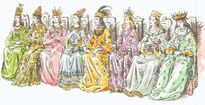
Jadis' Ancestors, the Royal family of Charn.
Jadis was born into the royal family of the world of Charn, who were said to be part-Jinn and part-Giant. Very little is known about her childhood or early adult life. It was known, however, that she had practiced witchcraft in her own world, and delved into dark magic, far beyond what was considered proper. She discovered a magic spell that her ancestors had hidden long before, strong enough to destroy all living things except the caster. This was known as the Deplorable Word, and was Jadis' greatest weapon.
As a member of the royal family, she became engaged in a global political struggle with her own sister, as the two fought to become Queen of their worldwide empire. At the beginning of this war, there was a clear agreement made between the two that prohibited the use of magic, though, according to Jadis herself, her sister broke this promise. The final battle of the conflict lasted three days, during which Jadis' forces were slaughtered completely by those of her sister until Jadis stood alone within her palace. As her sister climbed the palace terrace toward her, Jadis, rather than surrender, suddenly spoke the Deplorable Word. Charn instantly became a desolate world where all living organisms perished instantly. By default, Jadis became queen.
With no living creatures left to rule over, Jadis placed a spell upon herself that would preserve her sitting statuesquely beside the images of her ancestors in her palace's Hall of Images. She did this on the off chance that someday someone might come from another world, as the spell would last until the occasion when someone rang the small bell located in the Hall.
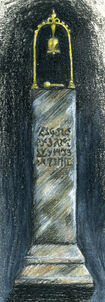
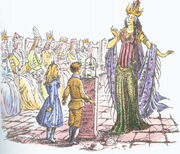
Jadis awakened.
In this state she remained for unknown centuries (but possibly a thousand years), until the bell was struck by two human children who had accidentally arrived in her world.
- "And the force of those spells was that I should sleep among them, like an image myself, and need neither food nor fire, though it were a thousand years, till one came and struck the bell and awoke me."
- ―Jadis (Chapter 5) [src]
Upon being awoken, she demanded the name of the magician who had sent for her. The boy who had woken her, Digory Kirke, told her that Andrew Ketterley, his uncle, was a magician from Earth. She also demonstrated her magical power by crumbling an immense and impenetrable black door.
Digory and his companion, Polly Plummer, were then forced to take Jadis back with them to their own world, by a combination of physical force and Jadis's charm to manipulate others, which she used to manipulate Digory.
Journey to Earth
On their journey, they had to travel through the Wood between the Worlds. There, Jadis seemed to suddenly become weaker, as she had difficulty breathing the air, and strangely appeared much uglier and even paler. The three passed on again, and all landed in Earth back at the house of Digory's uncle in England (in the Earth-year 1900). Jadis seemed revitalised, and, upon meeting Andrew, realised that he was only a very minor magician, and his abilities nothing compared to hers.
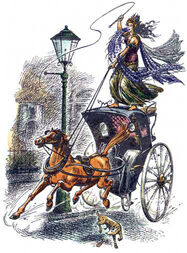
Jadis in London.
Andrew succumbed to her wishes in fright, and acted as her slave. Jadis began plotting her takeover of Earth, only to discover that much of her magic would not work there when she attempted unsuccessfully to cast a spell over Digory's Aunt Letty. Nonetheless, she began causing mayhem by mere force and intimidation, causing Letitia Ketterley, in confusion, to contact the local police.
Jadis, meanwhile, had attacked several people, robbed a jewelery store, and announced her intentions of world domination to the people of London, causing tumult. She had also stolen a cab and cabhorse, which she mounted after crashing the cab, using it as a chariot.
As the police closed in, Jadis had pulled an iron bar off of a lamppost and began striking out with it. The fight went on for several minutes until young Digory and Polly, by use of Andrew's magic rings, managed to drag her back into the Wood Between the Worlds. In the process, they inadvertently dragged the cabhorse, the cabdriver, and Uncle Andrew with them.
By another accident, all six were removed from the Wood and carried, not back into Charn, but into yet another new world; the unborn world of Narnia.
Early Narnia
This new world was completely dark when they arrived, but then a voice began to sing, and light appeared along with the Great Lion, Aslan, marking the beginning of Narnian-year 1. The lion's song created life all around them, including grass, trees and flowers growing abruptly from the ground. Jadis, understanding and disturbed by the sight of the dawning of life on a new planet, approached Aslan and hurled the lantern piece at him, though he seemed unaffected as it struck him. The bar landed in the ground, and thus grew into a fresh new lamp-post as if it were a blossoming new tree. Jadis, unable to manipulate the situation any longer, and realising she had arrived in a world that did not yet contain evil, fled, leaving her companions behind in the new world.
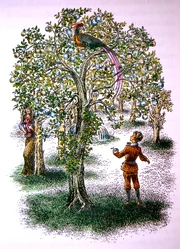
Jadis eating the Apple.
Jadis was indeed the first evil to enter Narnia, and her corruption would impact it for ages to come. Shortly afterwards, she learned that Aslan intended to plant a powerful tree in Narnia that would keep her out of the land, and that Digory was the one chosen to plant the tree. An intrigued Jadis made her own way to the garden containing the tree.
Once there, she plucked and greedily ate a silver apple of the Tree of Youth, thereby acquiring inexhaustible strength and even becoming immortal.
Upon Digory's arrival, she tried to persuade him to not plant the tree that would lead to her banishment; first by encouraging him to eat the fruit himself, telling him that it would grant him everlasting youth and life, and they could control Narnia together. Second, to give the fruit to his dying mother instead, assuring him that it would cure her of her illness.
Digory was able to resist both temptations, and even rebuffed her angrily. After his refusal, Jadis mocked him and immediately set out toward the north, far from Narnia and the Tree of Protection.
Apparently, Aslan had always intended for Jadis to eat from the Tree, as without eating the fruit her banishment would not have worked. Because she had stolen the fruit for herself, instead of being given it, she gained immortality, but at a high price. Cursed for her theft, she would now never know peace or happiness, only misery, and because she was now immortal, that meant that her misery would never end. And it was only after eating the fruit that its presence became a horror to her, repelling her and keeping her away for centuries to come.
For 900 years, Jadis lived in the Wild Lands of the North, biding her time and gathering her forces for a great attack on Narnia. During this time, her witchcraft powers grew consistently stronger, and she even created a new magic wand, which would give her the power to turn anyone into stone. Jadis is known to have worked at other magical spells and inventions during this time as well.
Eventually the Tree of Protection died, and when it did Jadis at last returned to the Kingdom of Narnia, and in the year of 900 she conquered the land and named herself The Queen of Narnia and Empress of the Lone Islands. She immediately put her centuries of magical study to work, fabricating a perpetual climate of snow and ice throughout the Kingdom, which not only oppressed the Narnian citizens, but also ensured that no more silver apple trees could be grown.
The Hundred Year Winter
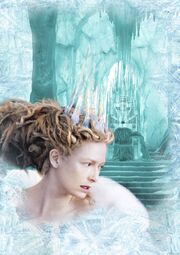
Her Imperial Majesty, Jadis, Queen of Narnia.
During the one hundred years of Jadis's reign, the seasons of spring, summer and autumn were extinct during this Long Winter.
She also famously banned the celebration of Christmas, her magic even able to keep Father Christmas out of the land.
Jadis became known among the Narnians as the White Witch, and quickly secured absolute control over the nation, establishing the first Narnian Secret Police, and building herself a palace.
She abolished any judicial system, merely punishing all of her political enemies by turning them into stone, and decorating their statuesque figures in her palace courtyard.
The Witch also banned any humans from Narnia. This was done in retaliation to the Golden Age Prophecy, which stated that she would someday be overthrown by two Sons of Adam and two Daughters of Eve.
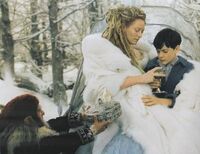
Jadis giving Edmund her food.
In the year 1000, Jadis came upon a young human in Narnia. After inviting him to sit with her, she learned that he was, indeed, one of the children foretold in the prophecy, though he did not yet know it. His name was Edmund Pevensie, and he was the third of four children from the world of Earth. He also informed her that his sister, Lucy, had previously visited Narnia.
Jadis also learned that one of her own spies, a Faun called Tumnus, had been harboring the human girl. By using her witchcraft, she had created some delicious and addictive food to give to Edmund, and, by exploiting his weaknesses, she was able to persuade him to come see her again, and bring with him all of his siblings, so that she could dispose of all of them.
Soon after, Tumnus was arrested by the secret police and turned into stone for his treachery against the Witch.
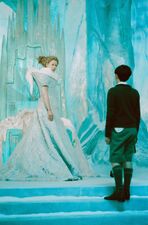
Jadis and Edmund.
Edmund and his siblings returned to Narnia, but once young Lucy and her elder siblings, Peter and Susan, discovered that Tumnus was gone, they became very cautious, and instead of going with Edmund to see Jadis, they stopped with a Beaver couple to discuss Tumnus' fate. Edmund then left them to go see Jadis and tell her that he had brought his siblings.
With all her potential victims in place, Jadis took Edmund prisoner and moved to arrest the other three humans. The Beavers and other members of the Narnian Resistance, however, had warned them and fled.
At this same time, word began to travel that Aslan, the Great Lion, had returned to Narnia, signaling the end of Jadis' days. The ecstatic Narnians, mostly comprising of talking beasts, inspired by the return of their lord and the leadership of the Pevensies, rose into rebellion in the Winter Revolution. With no other choice left to her, Jadis prepared to go to war.
Winter Rebellion
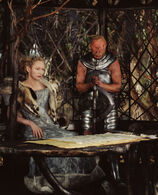
Jadis makes plans.
The War began in the Spring of the year 1000. Jadis' powers weakened with the return of Aslan and of the spring. Growing desperate, she chose to cut her losses and execute Edmund herself, thus preventing the fateful prophecy from coming completely true. She was interrupted, however, when Narnian soldiers stormed her encampment, which had followed her own soldiers from their retreat at the Battle of Aslan's Camp. Jadis and her personal dwarf escaped by magic, but Aslan's forces still made off with Edmund.
Jadis immediately switched tack to prepare for battle. Having already summoned all her soldiers, she launched a twofold plan; on the one hand, to prepare for an all-out military conflict, and on the other, to negotiate to weaken her enemies before the war. She had one powerful weapon, which could be used to the second end; her legal claim over Edmund Pevensie's life.

Jadis in Aslan's Camp.
Jadis traveled to Aslan's camp to present her claim and retake Edmund. Aslan, acknowledging her right, chose to negotiate with her. Unbeknownst to anyone in his own forces, Aslan chose to offer his own life in return. Jadis accepted, and a battle date was set for the following morning.
That night, Jadis and her armies took possession of the high ground at the Stone Table, where she was to sacrifice Aslan.
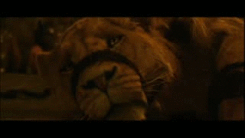
Aslan appeared, as planned, and after allowing her forces to humiliate and torture him, Jadis spoke a few words to him in private, reminding him that without his power, the four new kings and queens would never survive.
After stabbing him in the heart, she and her armies left to return to camp and arm up.
The following morning, Jadis engaged in combat against the newly made Prince Peter in the First Battle of Beruna. Her wand made her almost invincible, though the Narnians fought well against her. At the height of the conflict, the boy Edmund, now a prince, smashed through several of her guards and destroyed the wand, gravely wounding himself in the process. Shortly thereafter, Jadis engaged in a direct combat with Peter himself. In the midst of their climactic duel, Aslan arrived with reinforcements, having come back to life by his own magic.
Upon arriving, Aslan leapt on Jadis and killed her, finally ending the White Witch's tyranny once and for all.
War of Deliverance
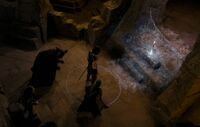
Jadis's near return during the Narnian Revolution.
Hundreds of years later, in the Narnian year of 2303 (during the Narnian Revolution), a Hag and a Werewolf, together with the aid of a Black Dwarf named Nikabrik, attempted to coerce Prince Caspian, Doctor Cornelius and the Badger Trufflehunter to resurrect the White Witch. They claimed that witches can never really die, and that they can always be brought back through a dark ritual, via something called the Blue Fire.
Fortunately, the ritual was interrupted before it could even begin, thanks to the intervention of King Peter, King Edmund and the Red Dwarf Trumpkin. There was a brief but bloody battle, during which the Hag, the Werewolf and Nikabrik were all killed, thereby preventing any chance of Jadis's return.
Right to Rule
The White Witch made two false claims that, if true, would have given her authority to rule over Narnia. The first claim was that she was human.
At the beginning of Narnia, Aslan gave "Sons of Adam and Daughters of Eve" dominion over all the beasts (non-talking or talking) and magical creatures of Narnia (even though they can and do reproduce with humans, Narnian dwarfs are not considered to be human; they are referred to as "Sons of Earth"). Although the White Witch appears human (despite her unnatural skin colour and above average height), she is of a race that is apparently descended from Adam's first wife, Lilith, and was apparently part-Jinn and part-giant.
Her second claim was that she was a servant of the Emperor-Over-the-Sea and ruled by his and Aslan's blessing. Because she was the first to rebel in Narnia, by the workings of the Deep Magic, she was given ownership and the right to kill all traitors and all those who willingly would follow her. She was in essence the Emperor's hangman, and carried out her executions on the Stone Table. In this way she could represent a Satanic figure, much more so in fact than Narnia's other Satanic figure, Tash.
Characteristics
Physical appearance
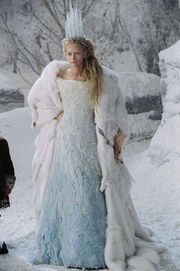
Jadis's main dress.
The Witch was a seven foot tall, strikingly beautiful and Amazonian woman, with a look of such fierceness and cold, stern pride that it took your breath away. She was depicted with long black hair and very red lips, and had an excellent sense of style, as she always dressed in an extravagant manner that showed off her power and status.
In The Magician's Nephew she was depicted in long, flowing Romanesque robes, while in The Lion, the Witch and the Wardrobe she wore white furs that covered her up to her throat. She also always wore a gold crown.
She had white skin, though presumably it originally had a more golden hue colour (as seen in the illustrations by Pauline Baynes), but after eating the apple from the tree of life in The Magician's Nephew, her skin turned as white as salt, and remained so in The Lion, the Witch and the Wardrobe.
Film Adaptation
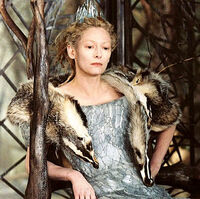
Dress in camp.
In the Disney films the Witch's hair was ash blonde, the reason being that actress Tilda Swinton stated that the film's director, Andrew Adamson, had conceived Jadis as being an Aryan figure or white supremacist. She also has a much more varied wardrobe.
She originally starts out wearing a glittering blue-white gown with a white fur cloak when she first meets Edmund. She wears the same dress when she is at her army's camp, but instead of the white fur she is wearing a badger fur stole.
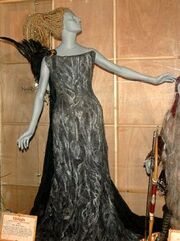
Jadis sacrificial dress.
At the sacrifice of Aslan she is wearing a black-gray dress that has a black-feathered cloak with a vulture's head, which sits at her right shoulder.
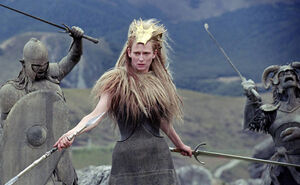
Jadis in battle.
At the battle-scene; she is wearing a sleeveless battle-dress with a skirt made of chainmail, and a cuirass of armor that is almost corset-like and made of dark gray leather. She also wears Aslan's mane at her neck, which she does as a tactic to instill fear and grief in the opposing army, and a golden plate headdress in her hair.
The headdress is angular with multiple spikes, and seems to be shaped like a stylized animal skull or perhaps antlers, with "fangs" hanging down over her forehead. Several multi-pronged arms extend from the top of the head down the sides and catch up the hair to the sides of the face. Otherwise her hair is worn free, streaming out from underneath the crown.
Jadis also obviously wears a crown, except in the battle when it is replaced by the golden headdress, but unlike in the books it is made of ice/crystal. It starts off long and pointy at the beginning of the film, looking as though the spikes are protruding from her head, but as time passes it gradually shrinks until finally it is almost gone. The reason for this, as told in the DVD commentary, is because the shrinking of the crown symbolises Jadis's weakening power.
Powers and abilities
Jadis was an incredibly powerful sorceress (magic running in the royal blood of Charn) but found her power largely useless on Earth, and significantly weaker on others. In Charn she had the ability to blast down doors, read minds, cast frightening spells on those who annoyed her, and could also employ the terrifying power of the Deplorable Word. She also had superhuman strength that she retained on Earth and in Narnia due to being a natural trait among her species.
In The Lion, the Witch and the Wardrobe, her powers have dramatically increased to the point that she is able to keep Narnia bound in winter for a hundred years, but she uses her impressive powers more sparingly.

One of her signature abilities is to transform living beings into stone statues. However, she needs a magic wand to cast spells, whereas in Charn she could cast spells with a mere word.
In the 2005 film, in addition to her magical abilities, Jadis has been shown to be an incredibly skilled warrior, as after Edmund destroyed her wand in the final battle, she very nearly killed him, and toyed with his older brother, Peter, in an impressive display of swordplay, just before she was slain by Aslan. It is obvious that she is toying with him, in the knowledge that she has the complete upper hand, so the full degree of her talent is unknown and unimaginable.
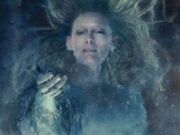
Jadis during her near resurrection.
It is mentioned by a Hag in Prince Caspian that witches, notably the White Witch, can never really die: they possess a form of immortality and can always be brought back through a dark ritual. Considering that Jadis was meant to be immortal, thanks to the fruit she ate from the Tree of Youth, this would seem to be a distinct possibility.
In the 2008 film, this possibility is fact, as her followers are able to resurrect her form, apparently due to the magic of her own wand. However, they could not bring her back completely, and for her to be able to return fully into the Narnian world, she needed a drop of Adam's blood. But even in her weakened state, she still had the ability to charm others, making Caspian want to give her some of his blood, and later she did the same to Peter.
Personality

White Witch in the animated film, with the voice of Beth Porter.
Jadis is depicted as the ultimate personification of pure evil in the Narnian universe, a satanic temptress responsible for bringing evil into Narnia. She was sadistic, arrogant and narcissistic, viewing herself as above all rules of conduct. She was incapable of viewing anyone as her equal, and saw others simply as tools to be used or obstacles to be demolished. With all these traits, it may be accurate to describe her as a sociopath. Jadis's personality was marked by a total lack of empathy or conscience. She had no concept of loyalty and no compassion for anyone, even after wiping out her entire species she showed a remorseless pride in her actions. A true megalomaniac, she was obsessed with power, and filled with a desire to conquer and subjugate everyone and everything she came into contact with.
Despite her vicious nature, however, she could be sweet and charming when she needed to be, mainly if it worked to her advantage (such as when she first met Edmund). Jadis was also prone to violent mood swings; calm and calculating one minute, and furious the next.
Jadis was shown to be extremely self-confident, almost to the point of rash impulsiveness, but showed fear and unease when around Aslan, though that part is understandable. She is possibly the only character in the series who possesses no redeeming traits, however, she is perhaps to be admired for her intellect, confidence and bravery. In the 2005 Disney film she is also portrayed as having something of a dry, cynical wit.
Weapons

Barbara Kellerman as Jadis in The Lion, the Witch & the Wardrobe BBC, 1988.
The Witch's primary weapon was her wand, which was a long, sceptre-like device capable of turning anyone or anything (with the possible exception of Aslan) into stone. In the books, the wand was made of gold, like Jadis's crown, and was capable of long range firing, whereas in the film it is made of ice or crystal, and requires vicinity with its victim to work.
In both the books and the 2005 Disney film, she possesses a stone dagger that she uses to kill Aslan.

The Witch's wand
In the film, she is also shown to be a formidable swordfighter, and employs the use of two swords in battle, which she wields with deadly proficiency. In the book, the swords are absent and she uses her dagger in battle, seemingly wearing her enemies down with pure belligerence rather than any special skill.
In The Magician's Nephew, she temporarily uses a bar of metal that she snapped off a lamp-post as a weapon.
Trivia
- The Witch is based on four characters in fiction: Satan from John Milton's Paradise Lost, Ayesha from She by H. Rider Haggard, The Snow Queen from Hans Christian Anderson's fantasy story of the same name, and the Queen of Babylon from The Story of the Amulet by Nesbit. The mythological character of Lilith was also an inspiration for her character, and Jadis is said to be descended from her in the stories.
- She has a tendency to walk back and forth, especially when unsure.
- Jadis' name, coincidentally or not, is equivalent to a word in the French language signifying "a long time ago".
- The scene, when Jadis arrived on Earth in The Magician's Nephew, and the havoc she caused there, was inspired by a similiar scene in another book, The Story of The Amulet, written by E. Nesbit in 1906, where an ancient Babylonian queen came to London in the early 20th century and caused mayhem.
Deaths
The way the Witch dies is different in each adaptation of The Lion, the Witch and the Wardrobe: -
- In the book; the only details given are that Aslan "flung himself upon the Witch", and that they "rolled over together but with the Witch underneath". When she is next mentioned, we learn she is dead.
- In the animated film; Aslan jumps from a high ledge and lands on top of the Witch, crushing her completely beneath him, thus destroying her.
- In the BBC TV show; Aslan kills the Witch with his roar, which causes her to lose her balance and fall off a cliff.
- In the Disney film; Aslan pins the Witch down and then completely devours her.
- It is almost certain that she entered Tash's Country upon her death.
Resurrection Theories
- During the events of the Disney version of the Prince Caspian film; Nikabrik, despairing of the Telmarine occupation, brought in a Hag and a werewolf who offered a way to revive the White Witch, by using her wand inside Aslan's How. However, Peter, Edmund, Lucy and Trumpkin arrived just in time to stop them. Jadis materialised as though entrapped behind a wall of ice, and tempted Caspian to free her, who was then pushed away by Peter, only for her to begin to charm him also, but the wall of ice was then shattered from behind by Edmund, making the Witch disappear instantly.
- In the original literary version, Nikabrik also prepares to resurrect the Witch, but he and his two allies are slain before they can even begin the ritual.
- There is another theory that the Witch later reappears in The Silver Chair as the Lady of the Green Kirtle, who is effectively merely a resurrected form of Jadis. Later in the book, she transformed into a giant green serpent, but was killed by Rilian, thus dying for certain. There is little evidence to support this theory, however, which was mostly the result that the White Witch and the Green Witch were played by the same actress in the BBC adaptations, and that some versions of the series have character descriptions at the beginning, which say Jadis appears in both The Lion, the Witch and the Wardrobe, as well as in the Silver Chair.
- Glimfeather the owl called the Green Witch "One of the same crew," referring to the "Northern witches." This could not be possible if they were one and the same. Also, if they were the same person, C.S. Lewis would have probably confirmed such a theory.
- Glimfeather the owl called the Green Witch "One of the same crew," referring to the "Northern witches." This could not be possible if they were one and the same. Also, if they were the same person, C.S. Lewis would have probably confirmed such a theory.
Template:New Succession box
Template:New Succession box

|
"Well done, son of Adam. For this fruit you have hungered and thirsted and wept."
|
